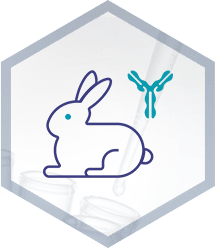
Custom Rabbit Monoclonal Antibody Production by Phage display
BIOTEM proposes Rabbit Monoclonal Antibody Development and Production with the Phage Display Technology.
Advantages of Rabbit Monoclonal Antibody:
- High affinity and Specificity
- Recognition of a broad diversity of targets (smaller epitopes, phospho-epitopes, haptens, etc.)
- Somatic mutations in the VH and VL are more frequent
- CDR3-loop of the light chain is longer
Rabbit monoclonal antibodies are therefore of greatest interest for research and diagnostic applications.

BIOTEM does not claim any intellectual properties nor any other rights on the developed antibodies.
- Detection of small molecules (haptens) and non-protein molecules
- Development of immunoassays (low limit of detection)
- Post-translational modification detection (phosphorylation, acetylation, etc.)
- Immunohistochemistry / Immunofluorescence
- Antigen detection in mouse samples
Project
Specifications
1. Project Specifications
For each project, our team explores with the client the challenges of the project and defines together the specifications.
- The target of interest: membrane protein, peptide, small molecule, post-translational modifications, etc.
- Applications: ELISA, WB, FACS, IF, IHC, IP, functional tests, diagnostic application, etc.
- Specifications: Available material, specificity, deadlines, etc.
Taking into account these multiple parameters, BIOTEM proposes tailor-made strategies to meet the client's needs and guarantee the success of the project.
Immunization
Rabbit
2. Immunization
Depending on the client's specifications, BIOTEM has a wide range of proven immunization strategies to obtain high affinity and specificity antibodies. Specific methods are developed to ensure that the appropriate immune response is achieved. At the end of this phase BIOTEM will be able to offer a contract with guaranteed results. The client will also have the possibility to test the sera in his application.
- Protein Immunization : From the production of the recombinant protein (transient transfection in CHO) to its preparation for immunization.
- Peptide Immunization : Immunization with peptides is a relevant strategy for the generation of antibodies directed against selected epitopes. This approach also reduces the need for sophisticated protein preparations for immunization (see also IHC Peptide Profiler®)
- Small Molecule Immunization (Haptens)
- Non-exhaustive list
Library &
Phage Display
3. Library & Phage Display
Unlike naive or synthetic libraries, BIOTEM proposes the construction of an immune library, in scFv format, focused on the target of interest combined with high throughput screening (or bio-panning) by phage display. This optimizes the chances of success in obtaining high affinity and high specificity antibodies.
- Selection of a large number of scFv candidates (VH+VL only)
- Optimized screening with different stringency conditions (direct, competitive, subtractive, etc.)
- Immediate access to sequences (single clones - redundancy analysis)
- Production, Purification and Characterization of candidates (reactivity, affinity, etc.).
At the end of this phase the client will have the opportunity to test the scFv and select the best candidates for the reformatting phase in full Ig format.
Reformatting
Engineering
4. Reformatting
This step allows the transition from scFv to full immunoglobulin format (or orther formats : scFv-Fc, etc.) thanks to a fully integrated platform for the production of recombinant antibodies in mammalian cells (CHO). More info
- Several Isotypes
- Sequence Optimization
- Antibody Engineering (Isotype, mutations, Fc-fusion protein, Bispecific antibodies, Fab, etc.)
- Variants (Chimerization, humanization,etc.)
- Production & Purification (pilot study).
The CLIENT will decide which candidates to produce in large scales.
Production &
Purification
5. Production & purification
Large scale productions are available with our CHO cell Platform. More info
- From milligram to several grams
- Low endotoxin Conditions(< 10 EU/mg ; < 1 EU/mg)
- Serum free System
- Quality Control (concentration, purity, affinity, aggregation, stability, etc.).
Why Develop and Produce Rabbit Monoclonal Antibodies Using Phage Display?
BIOTEM proposes Rabbit Monoclonal Antibody Development and Production with the Phage Display Technology.
1. Why choose rabbit monoclonal antibodies over mouse monoclonal antibodies?
Rabbit monoclonal antibodies (mAbs) generally offer higher affinity, better specificity, and broader epitope recognition than mouse mAbs. This is particularly beneficial for recognizing small molecules, post-translational modifications, and weakly immunogenic epitopes.
2. What are the advantages of using phage display for antibody production?
Phage display allows the selection of high-affinity antibodies from hyper-immune libraries without the risk of instability with hybridomas. It provides direct access to clone sequences, facilitates antibody engineering (sequence optimization, reformatting, etc.) and recombinant antibody production.
3. How does phage display improve the selection of rabbit monoclonal antibodies?
Phage display enables the rapid isolation of specific antibodies from large, diverse libraries derived from rabbit B cells. It allows for in vitro selection under defined conditions (e.g., pH, detergents, or competitive inhibitors), improving antibody performance in applications like diagnostics.
4. Are rabbit-derived antibodies more sensitive in research and diagnostics?
Yes. Rabbit antibodies typically have higher affinity and specificity, leading to improved signal-to-noise ratios in immunoassays like ELISA, Western blotting, and immunohistochemistry (IHC). Their ability to recognize small structural differences makes them ideal for detecting biomarkers and disease-related targets.
5. How does phage display compare to hybridoma technology for rabbit antibodies?
Hybridoma technology is challenging in rabbits due to the inefficiency of rabbit-rabbit hybridomas. Phage display bypasses this limitation by directly isolating antibody from immunized rabbits and displaying them on bacteriophages for selection. This process is faster, more efficient, and allows direct engineering of antibody properties.
6. Can rabbit monoclonal antibodies be humanized for therapeutic applications?
Yes. Even if murine monoclonal antibodies (mouse or rat) are more widely used, phage display enables straightforward humanization of rabbit antibodies by grafting complementarity-determining regions (CDRs) onto human antibody frameworks. This makes them suitable for therapeutic use while maintaining their high affinity and specificity.
7. What are the main applications of rabbit monoclonal antibodies produced via phage display?
These antibodies are widely used in:
-
Biomedical research (e.g., detecting disease biomarkers)
-
Diagnostics (e.g., ELISA, immunohistochemistry)
-
Therapeutics (e.g., targeted treatments in oncology and autoimmune diseases)
-
Biotechnology (e.g., biosensors and biopharmaceutical development)
8. Are phage display-derived rabbit monoclonal antibodies cost-effective?
Yes. Although initial library construction requires investment, phage display reduces the risk of failure due to the instability of some hybridomas, streamlines antibody selection, and enables large-scale production, ultimately lowering long-term costs.
9. What are the main challenges in developing rabbit monoclonal antibodies via phage display?
Challenges include optimizing library construction from rabbit immune repertoires, ensuring antibody stability, and engineering antibodies for specific applications. However, advances in library design and bioinformatics tools help overcome these hurdles.
10. How does phage display contribute to antibody engineering and optimization?
Phage display allows directed evolution of antibodies, including affinity maturation, specificity tuning, and antibody engineering (humanization, chimerization, etc.). This ensures that the final antibodies meet specific research, diagnostic, or therapeutic needs.


To access the document, please fill the form

